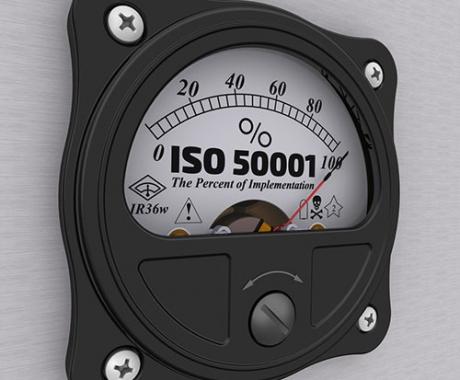Jul 2021
The mandatory energy audit
In terms of energy efficiency, two major standards currently coexist in France: one is compulsory and the other is not, but it still deserves our attention... On one hand, the NF EN 16247 standard requires large companies to carry out an energy audit every 4 years.

Is the ISO 50001 standard more efficient than the mandatory energy audit NF EN 16247?
In terms of energy efficiency, two major standards currently coexist in France: one is compulsory and the other is not, but it still deserves our attention...
On one hand, the NF EN 16247 standard requires large companies to carry out an energy audit every 4 years. On the other hand, the ISO 50001 standard is not compulsory, and any business wishing to reduce its energy consumption can apply for it.
It supersedes the NF EN 16247 standard by its precision and rigor: a company with the ISO 50001 certification is exempt from doing the 16247 energy audit.
The certified company also benefits from a positive image, as it sends the signal of quality and seriousness. Is the ISO 50001 standard ultimately more beneficial for a company?
The mandatory NF EN 16247 audit: a relatively satisfactory solution
The mandatory energy audit was instated by the DDADUE law in 2013 (the result of a European directive). It imposes reductions in consumption but it does not provide an encouraging framework.
A chore more than a commitment
The mandatory energy audit for large companies is intended for businesses with more than 250 employees or with a turnover of over 50 million euros (with a balance sheet of over 43 million euros). Approximately 6,000 companies in France are affected.
Despite what the law says, these companies are more or less diligent in their efforts to reduce energy consumption. While they do submit to this obligation every 4 years, the conditions don't necessarily measure up with the urgency of the energy transition.
Many companies wish to “get rid” of this “chore” without identifying real issues or long-term benefits. According to the ADEME agency, some companies entrust their audit to firms that lack the necessary experience and rigor in the energy performance of buildings.
Distant deadlines
The next deadline (which is only the second once since the law came into effect) will be in December of this year. Some companies are tempted to rush the process and don't necessarily make the right choices when completing the audit.
The audit ends up becoming more of an administrative matter instead of being grounded in the realities of climate change. This may be due to the audit's mandatory and coercive nature, since infringements of any kind can lead to a significant financial sanction.
Besides, since the audit takes place over several years, continuous efforts aren't readily encouraged. To a certain extent, the audit is about fulfilling one's obligations every four years and not looking past that. That seems to be its most important drawback.
ISO 50001, the strength of an optional standard
The ISO 50001 standard came after the mandatory audit. It was first published in 2011 (then updated in 2018). It is the result of collaboration between 61 countries and of good practices carried out in various places around the world.
It has since been viewed as being the official energy management reference for all private and public structures internationally.

As for all ISO standards, it is not mandatory. Specific numeric figures do not need to be reached. Instead, the ISO 50001 standard sets a framework and provides concrete ways to reduce consumption. While it seems more modest from the outside, it is no less effective and, perhaps, even more so than an audit every 4 years. It also presents a distinct advantage, in that an ISO 50001 certified company is automatically exempt from the mandatory NF EN 16247 audit.
While the certification is optional, it really shows that the company or the public organisation is committed to:
Continuously decreasing its energy consumption
This is the main advantage of the ISO 50001 standard, even a priority: to continuously improve the energy efficiency of a building. The public and corporate entities choosing to go forward with this certification also commit to an energy management system. The latter encourages them to make constant efforts and to find levers to reduce consumption. More generally, a real policy aimed at improving daily energy performance is needed to attempt the ISO 50001 certification.
The Corporate Social Responsibility of companies and communities
The “social” responsibility of companies and of public organisations is a challenge for all of the people involved in sustainable development. By putting the ISO 50001 certification at the heart of their environmental approach, private and public structures are moving forward in a more supervised manner and with a real vision. In addition, the ISO 50001 standard assumes that all relevant parties are actively involved in the process, just as they are meant to be in the context of CSR. The ISO 50001 standard can therefore be seen as a common project for the users of a same building.
Corporate communication
Investing in the ISO 50001 standard and communicating around it is a true advantage, far from "green washing" and its adverse effects. Companies and communities are therefore encouraged to highlight their efforts and their results through transparent communication. The effects are numerous: they gain the trust of investors; it is a solid way of attracting talent to the business; it inspires other companies / organisations through a snowball effect. In other words, the ISO 50001 standard is full of advantages.
A € 40,000 bonus to complete the structure's transformation
Attempting to obtain the ISO 50001 certification gives the right to a € 40,000 subsidy which covers 70% of the cost of installing an energy management system. It is called PRO-SMEn and stands for programme de système de management de l’énergie. It helps companies and communities invest in this certification for the right reasons. And, according to the French Ministry of the Environment, the remaining investments are very quickly absorbed.
Whether you, as a company, want to meet your mandatory energy audit obligations, or whether you want to become ISO 50001 certified, we, at Datanumia, have the technological and human solutions you need!
Last news



